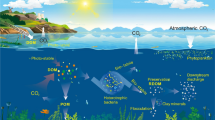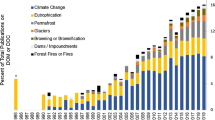Abstract
Warming has been affecting carbon cycling in freshwater ecosystems throughout recent decades. However, how the co-metabolism effect (CE) during the decomposition of sediment organic carbon (SOC) in eutrophic lakes responds to warming remains understudied. A 33-day experiment was conducted to examine the mechanisms that underpin the CE in lacustrine sediments. The results indicated that warming increased the co-metabolism intensity of sedimentary organic matter. At the beginning of the experiment (0–9 d), the co-metabolism intensity increased rapidly at both 25℃ and 35℃. However, at the end of the experiment (33 d), the cumulative co-metabolism intensity was highest at 25℃, which was 33.75% and 153.74% higher than the intensities at 15℃ and 35℃, respectively. By enhancing the co-metabolism intensity of the SOC, warming would weaken lakes “carbon sink” functions. Thus, our study provides novel evidence that microorganisms regulate SOC turnover and effectively maintain a balance between resources and microbial requirements.



Similar content being viewed by others
References
Bastida F, Garcia C, Fierer N, Eldridge DJ, Bowker MA, Abades S, Delgado-Baquerizo M (2019) Global ecological predictors of the soil priming effect. Nat Commun, 10(1), 3481. https://doi.10.1038/s41467-019-11472-7
Bianchi TS (2011) The role of terrestrially derived organic carbon in the coastal ocean: a changing paradigm and the priming effect. Proc Natl Acad Sci U S A, 108(49), 19473–19481. https://doi.10.1073/pnas.1017982108
Chen J, Elsgaard L, van Groenigen KJ, Olesen JE, Liang Z, Jiang Y, Jorgensen U (2020) Soil carbon loss with warming: New evidence from carbon-degrading enzymes. Glob Chang Biol. https://doi.10.1111/gcb.14986
Chen J, Luo Y, Garcia-Palacios P, Cao J, Dacal M, Zhou X, van Groenigen KJ (2018) Differential responses of carbon-degrading enzyme activities to warming: Implications for soil respiration. Glob Chang Biol, 24(10), 4816–4826. https://doi.10.1111/gcb.14394
Chen J, Luo YQ, Xia JY, Wilcox KR, Cao JJ, Zhou XH, Wang RW (2017) Warming Effects on Ecosystem Carbon Fluxes Are Modulated by Plant Functional Types. Ecosystems, 20(3), 515–526. https://doi.10.1007/s10021-016-0035-6
Davidson TA, Audet J, Jeppesen E, Landkildehus F, Lauridsen TL, Sondergaard M, Syvaranta J (2018) Synergy between nutrients and warming enhances methane ebullition from experimental lakes. Nature Climate Change, 8(2), 156. https://doi.10.1038/s41558-017-0063-z
Fontaine S, Barot S, Barre P, Bdioui N, Mary B, Rumpel C (2007) Stability of organic carbon in deep soil layers controlled by fresh carbon supply. Nature, 450(7167), 277–280. https://doi.10.1038/nature06275
Grasset C, Mendon?A R, Villamor Saucedo G, Bastviken D, Roland F, Sobek SJL, Oceanography (2018) Large but variable methane production in anoxic freshwater sediment upon addition of allochthonous and autochthonous organic matter
Gudasz C, Bastviken D, Steger K, Premke K, Sobek S, Tranvik LJ (2010) Temperature-controlled organic carbon mineralization in lake sediments. Nature 466(7305):478–481
Gudasz C, Sobek S, Bastviken D, Koehler B, Tranvik LJ (2015) Temperature sensitivity of organic carbon mineralization in contrasting lake sediments. Journal of Geophysical Research-Biogeosciences, 120(7), 1215–1225. https://doi.10.1002/2015jg002928
Hopkins FM, Torn MS, Trumbore SE (2012) Warming accelerates decomposition of decades-old carbon in forest soils. Proc Natl Acad Sci U S A, 109(26), E1753-1761. https://doi.10.1073/pnas.1120603109
Ma J, Xu X, Yu C, Liu H, Wang G, Li Z, Shi R (2020) Molecular biomarkers reveal co-metabolism effect of organic detritus in eutrophic lacustrine sediments. Sci Total Environ, 698, 134328. https://doi.10.1016/j.scitotenv.2019.134328
Mendonca R, Muller RA, Clow D, Verpoorter C, Raymond P, Tranvik LJ, Sobek S (2017) Organic carbon burial in global lakes and reservoirs. Nat Commun, 8(1), 1694. https://doi.10.1038/s41467-017-01789-6
Min K, Buckeridge K, Ziegler SE, Edwards KA, Bagchi S, Billings SA (2019) Temperature sensitivity of biomass-specific microbial exo-enzyme activities and CO2 efflux is resistant to change across short- and long-term timescales. Glob Chang Biol, 25(5), 1793–1807. https://doi.10.1111/gcb.14605
Tamura M, Tharayil N (2014) Plant litter chemistry and microbial priming regulate the accrual, composition and stability of soil carbon in invaded ecosystems. New Phytologist, 203(1), 110–124. https://doi.10.1111/nph.12795
Thiessen S, Gleixner G, Wutzler T, Reichstein M (2013) Both priming and temperature sensitivity of soil organic matter decomposition depend on microbial biomass – An incubation study. Soil Biology Biochemistry 57:739–748
Velthuis M, Kosten S, Aben R, Kazanjian G, Hilt S, Peeters E, Bakker ES (2018) Warming enhances sedimentation and decomposition of organic carbon in shallow macrophyte-dominated systems with zero net effect on carbon burial. Glob Chang Biol, 24(11), 5231–5242. https://doi.10.1111/gcb.14387
Wang X, Tang C (2018) The role of rhizosphere pH in regulating the rhizosphere priming effect and implications for the availability of soil-derived nitrogen to plants. Ann Bot, 121(1), 143–151. https://doi.10.1093/aob/mcx138
Xue K, Yuan MM, Shi ZJ, Qin YJ, Deng Y, Cheng L, Zhou JZ (2016) Tundra soil carbon is vulnerable to rapid microbial decomposition under climate warming. Nature Climate Change, 6(6), 595-+. https://doi.10.1038/Nclimate2940
Yan XC, Xu XG, Wang MY, Wang GX, Wu SJ, Li ZC, Yang YH (2017) Climate warming and cyanobacteria blooms: Looks at their relationships from a new perspective. Water Research, 125, 449–457. https://doi.10.1016/j.watres.2017.09.008
Yvon-Durocher G, Allen AP, Montoya JM, Trimmer M, Woodward G (2010) The Temperature Dependence of the Carbon Cycle in Aquatic Ecosystems. Advances in Ecological Research, Vol 43: Integrative Ecology: From Molecules to Ecosystems, 43, 267–313. https://doi.10.1016/S0065-2504(10)43007-X
Funding
This work was supported by Ecological environment scientific research project of Jiangsu Province (No. JSZC-G2021-291), Major Science and Technology Program for Water Pollution Control and Treatment (No. 2017ZX07301006), The Special basic research service for the Central Level Public Welfare Research Institute (No. GYZX210517), The Special Fund of Chinese Central Government for Basic Scientific Research Operations in commonweal Research Institute (No. GYZX220405), National Natural Science Foundation of China (42107280), Doctoral Scientific Research Foundation of Suzhou University (2019jb26).
Author information
Authors and Affiliations
Corresponding author
Additional information
Publisher’s Note
Springer Nature remains neutral with regard to jurisdictional claims in published maps and institutional affiliations.
Rights and permissions
Springer Nature or its licensor holds exclusive rights to this article under a publishing agreement with the author(s) or other rightsholder(s); author self-archiving of the accepted manuscript version of this article is solely governed by the terms of such publishing agreement and applicable law.
About this article
Cite this article
Ma, J., Lai, Q., He, F. et al. Warming Enhances the Co-Metabolism Effect During the Decomposition of Sediment Organic Carbon in Eutrophic Lakes. Bull Environ Contam Toxicol 109, 984–989 (2022). https://doi.org/10.1007/s00128-022-03608-1
Received:
Accepted:
Published:
Issue Date:
DOI: https://doi.org/10.1007/s00128-022-03608-1




